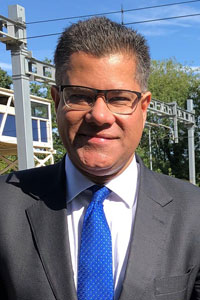Last week we marked one year to go until the COP26 international climate summit, which will be hosted in the UK. This will be a pivotal moment for the world to come together and agree ambitious steps to prevent the catastrophic warming of our planet.
This is an issue of crucial significance not just as we navigate the current global pandemic, but for the years and decades ahead.
Because while the world has been dealing with coronavirus, the dangers of global warming have continued to become more evident. Just this year, we have seen unprecedented heatwaves in Siberia, flash floods across East Africa and vast areas of the Western United States ravaged by wildfires.
Studies suggest that Thailand is the country sixth most impacted by climate change in the past 20 years. The recent historic drought and subsequent severe flooding last month are reminders of this. Forecasts predict that more than 30% of Bangkok may routinely flood as soon as 2030 as the Gulf of Thailand rises due to melting sea ice, while rice production in the Chao Phraya basin risks falling sharply within the next 15 years due to climate change.
As countries continue to manage the impact of the coronavirus pandemic, they also face an important choice: whether to invest in building back greener economies or locking in polluting emissions for decades to come.
As incoming President of COP26, I am encouraged by what I have seen so far of governments and businesses rallying behind the goal of reaching net-zero greenhouse gas emissions by 2050.
In September, President Xi Jinping announced that China will reach carbon neutrality (net-zero greenhouse gas emissions) before 2060. Prime Minister Yoshihide Suga of Japan and President Moon Jae-in of South Korea announced that both Japan and South Korea will aim to reach carbon neutrality by 2050. Earlier this year, Singapore took a step forward in its efforts to tackle climate change by announcing its ambition to reach net-zero emissions by the second half of the century through their Long-Term Low-Emissions Development Strategy (Leds), the first of its kind in Asean.
According to the Climate Action Tracker, there are now 126 countries, together responsible for over half of global emissions, with similar carbon or climate neutrality announcements.
Non-government actors are contributing too; for example, by signing up to the Race to Zero, a global campaign mobilising cities, regions, businesses and investors all committed to the same overarching goal: achieving net zero emissions by 2050 at the very latest. This is a great way for businesses and other organisations to help address climate change and we're pleased to see many Thai businesses sign on through initiatives such as the Climate Ambition Alliance and Business Ambition for 1.5.
Ambitious world leaders have made a really positive start, but now there is more to be done.
On Dec 12, the UK will co-host a Climate Ambition Summit with the UN and France, and in partnership with Chile and Italy, to mark the fifth anniversary of the landmark Paris Agreement.
Every country subject to the Paris Agreement will be invited to the virtual event which will focus on action to reduce emissions and build resilience to climate impacts, whether through adaptation or through climate finance.
I hope that Thailand will attend. It is vital that we work together, as a planet to prepare and adapt to the challenges of climate change, but also to prevent catastrophic changes to the Earth. I hope, too, that Thailand will join the vast majority of countries around the world in announcing a commitment to cut greenhouse gases further than it previously announced in 2015.
A green economic recovery could create many opportunities. Recently, the IEA announced that solar -- which Thailand could benefit from more than most -- is now the cheapest form of power globally. Here in Thailand, too, there are exciting proposals to turn the country into an electrified vehicle production hub in five years and there is discussion of having 1.2 million electric vehicles on the roads by 2030. This would cut greenhouse gas emissions and position Thailand at the forefront of this growing new industry.
But across the economy key sectors including tourism, agriculture and infrastructure can benefit from a sustainable, green recovery. We are pleased to have a close partnership between the UK and Thailand on climate change and the low carbon transition to realise these opportunities.
So now, I am calling on all countries to bring their highest ambitions to the table, for what I hope will be a key moment for our planet.
The UK will use the time ahead of COP26 to raise ambition for climate action.
